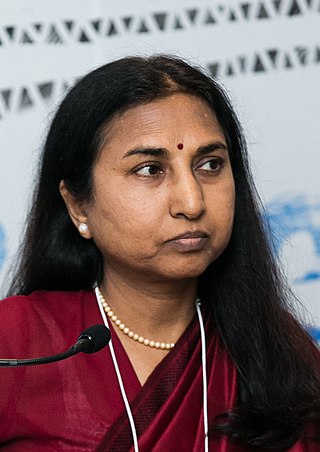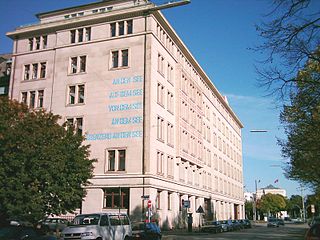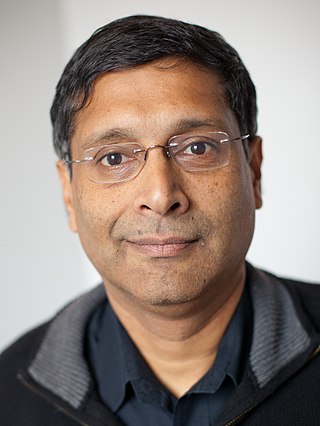
A think tank, or policy institute, is a research institute that performs research and advocacy concerning topics such as social policy, political strategy, economics, military, technology, and culture. Most think tanks are non-governmental organizations, but some are semi-autonomous agencies within government or are associated with particular political parties, businesses or the military. Think-tank funding often includes a combination of donations from very wealthy people and those not so wealthy, with many also accepting government grants.

Ross McKitrick is a Canadian economist specializing in environmental economics and policy analysis. He is a professor of economics at the University of Guelph, and a senior fellow of the Fraser Institute.

Jomo Kwame Sundaram, fondly known just as Jomo, is a prominent Malaysian economist. He is a senior adviser at the Khazanah Research Institute, visiting fellow at the Initiative for Policy Dialogue, Columbia University, and an adjunct professor at the International Islamic University (IIUM).
ODI is a global affairs think tank, founded in 1960. Its mission is "to inspire people to act on injustice and inequality through collaborative research and ideas that matter for people and the planet." It does this through "research, convening and influencing, to lead new thinking and future agendas to deliver transformational change." Its Chair is Suma Chakrabarti.

The School of Global Policy and Strategy (GPS) at the University of California San Diego, formerly the Graduate School of International Relations and Pacific Studies (IR/PS), is devoted to the study of international affairs, economics, and policy education. Until 2015, it stood as the only professional school of international affairs that was exclusively focused on Asia and the Americas.

Kwangwoon University is a comprehensive, coeducational and private research university in Seoul, South Korea, offering undergraduate and graduate programs. Chosun Radio Training Center, the predecessor of Kwangwoon University, was the first institution to teach electronic engineering studies in Korea(Chosun). The foundation is Kwangwoon Academy, an incorporated educational institution. As of 2019, there are 11,500 undergraduates and 1,292 graduate students. The nearest subway station is Kwangwoon University Station, Seoul Metro Line 1.
B. S. Chimni is a legal scholar and academic who is presently distinguished professor of international law member at Jindal Global Law School. His areas of expertise include international law, international trade law and international refugee law. He has been chairperson of the Centre for International Legal Studies at Jawaharlal Nehru University, New Delhi. He had a 2+1⁄2-year stint as vice chancellor of the West Bengal National University of Juridical Sciences. He has been a visiting professor at the International Center for Comparative Law and Politics, Tokyo University, a Fulbright Visiting Scholar at Harvard Law School, visiting fellow at Max Planck Institute for Comparative Public Law and International Law, Heidelberg, and a visiting scholar at the Refugee Studies Center, York University, Canada.

The Centre for Policy Dialogue (CPD), established in 1993 by Rehman Sobhan, its Founder chairman, with support from leading civil society institutions in Bangladesh, is mandated by its Deed of Trust to service the growing demand originating from the emerging civil society of Bangladesh for a more participatory and accountable development process. CPD seeks to address this felt-need from the perspectives of marginalised stakeholders, by way of organising multistakeholder consultations, by conducting research on issues of critical national, regional and global interests, through dissemination of knowledge and information on key developmental issues, and by influencing the concerned policy making processes.

Bina Agarwal is an Indian development economist and Professor of Development Economics and Environment at the Global Development Institute at The University of Manchester. She has written extensively on land, livelihoods and property rights; environment and development; the political economy of gender; poverty and inequality; legal change; and agriculture and technological transformation. Among her best known works is the award-winning book—A Field of One's Own: Gender and Land Rights in South Asia—which has had a significant impact on governments, NGOs, and international agencies in promoting women's rights in land and property. This work has also inspired research in Latin America and globally.

The German Institute for Global and Area Studies (GIGA) is a German research institute. It analyses political, economic and social developments in Africa, Asia, Latin America and the Middle East, and combines this analysis with comparative research on international relations, development and globalisation, violence and security, and political systems. The GIGA advises the Federal Foreign Office and other branches of the federal government. The institute is based in Hamburg and has an office in Berlin.
The Lee Kuan Yew School of Public Policy is an autonomous postgraduate school of the National University of Singapore (NUS), named after the late former Prime Minister of Singapore, Lee Kuan Yew.
Edward Lawrence Wheelwright (1921–2007) was a notable Australian economist, radio host and anti-war activist who taught at the University of Sydney from 1952 until 1986. He has written on Australian economic history, often from an institutionalist or Marxian perspective, and his published works have included the analysis of capitalism in Australian history and an analysis of the influence and development of transnational corporations. He authored 11 books independently and 5 with co-editors, and made frequent appearances on ABC Radio's Notes on the News program. He is the namesake of a memorial lecture at the University of Sydney and an annual prize in the university's political economy course. While at the University of Sydney, he set up the Transnational Corporations Research Project.

Deepak Nayyar is an Indian economist and academician. He is a professor of economics at Jawaharlal Nehru University, New Delhi and Chairperson of the Board of Governors of Centre for the Study of Developing Societies (CSDS) New Delhi. He has taught at the University of Oxford, the University of Sussex, the Indian Institute of Management Calcutta (IIM-C), and the New School for Social Research, New York City. He was Vice Chancellor of the University of Delhi from 2000 to 2005.
Paul J.J. Welfens was a German economist.
M. V. Ramana is Professor and Simons Chair in Disarmament, Global and Human Security at the University of British Columbia, and Director of Liu Institute for Global Issues, at the School of Public Policy and Global Affairs. A physicist by training, he previously worked at the Nuclear Futures Laboratory and the Program on Science and Global Security, both at Princeton University. Ramana is a member of the International Panel on Fissile Materials, the Canadian Pugwash Group, the International Nuclear Risk Assessment Group, and the team that produces the annual World Nuclear Industry Status Report.

Arvind Subramanian is an Indian economist and the former Chief Economic Advisor to the Government of India, having served from 16 October 2014 to 20 June 2018. Subramanian is currently a Senior Fellow at the Watson Institute for International and Public Affairs at Brown University. He previously served as Professor of Economics at Ashoka University and a Senior Fellow at the Peterson Institute for International Economics and Center for Global Development.

The Institute of Economic Growth (IEG) is an autonomous, multidisciplinary Centre for advanced research and training. Widely recognized as a Centre of excellence, it is one of India's leading academic institutions in the fields of economic and social development. Established in 1958, its faculty of about 23 social scientists and a large body of supporting research staff focus on emerging and often cutting-edge areas of social and policy concern. Many past and current faculty members are internationally renowned and award-winning scholars.

Yana van der Meulen Rodgers is a professor in the Department of Labor Studies and Employment Relations in the School of Management and Labor Relations at Rutgers University,. She also serves as Faculty Director of the Center for Women and Work at Rutgers.
South Asia Economic Journal is a blind peer-reviewed journals that provides a forum to discuss South Asia's position on global economic issues, its relations with other regional groupings and its response to global developments.
The Asian Barometer Survey is a comparative survey of 18 Asian states and territories. These include Japan, Mongolia, South Korea, Taiwan, Hong Kong, China, Philippines, Thailand, Vietnam, Cambodia, Singapore, Indonesia, Malaysia, India, Pakistan, Bangladesh, Sri Lanka, and Nepal. It is organised by the Academia Sinica and National Taiwan University. Its founders are members of the Global Barometer Survey group. The data is gathered with face-to-face interviews, which cover topics ranging from economic conditions and social capital, to political participation, partisanship, traditionalism, and trust in institutions.












